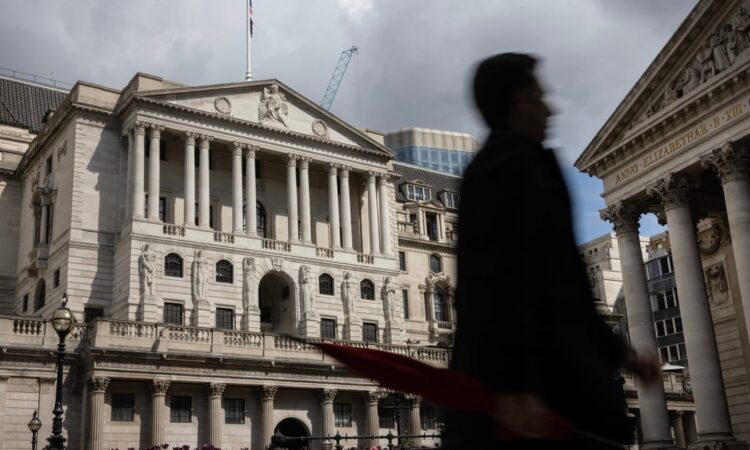
Press play to listen to this article
Voiced by artificial intelligence.
SINTRA, Portugal — Reality isn’t falling in line with the expectations of Europe’s central bankers — and some of them are getting frustrated.
Since last year central banks have ratcheted up the cost of borrowing in an effort to reduce spending and beat inflation, but people — and in some cases governments — just aren’t reacting as bankers hoped they would.
In the U.K., for instance, efforts to curb excess demand have been offset by the unexpected ‘hoarding’ of labor by companies. Without the threat of unemployment, staff have been able to push through bigger wage claims, which have among other things sustained a boom in expenditures on ‘fun.’
Meanwhile, although headline inflation, which includes energy and food prices, appears to be leveling out, it’s not yet clear if underlying ‘core’ inflation will follow, as previously expected.
At the European Central Bank, analysts raised their forecasts for peak inflation — something that left some in the ECB’s own governing council feeling disheartened.
“How many times are we going to say we’ve been surprised, we’ve been surprised, we’ve been surprised,” said one Governing Council member at an elite central banking gathering in Sintra, Portugal, granted anonymity to speak on this sensitive matter openly. “Of course, crises bring out uncertainty, but we’re groping in a dark room, so to speak.”
Former Bank of England economist Silvana Tenreyro, speaking on a panel at Sintra, went so far as to say that central bankers are “on the edge” of their expertise, especially when it comes to the management of public “expectations” about how much inflation will persist, a key component of the effort to fight it.
“Economic researchers,” she said, are “veering into fields such as psychology and neuroscience.”
Knowledge gaps
One issue is that successive global crises have left gaping holes in bankers’ confidence in how markets work.
A number of speakers at Sintra, for instance, emphasized the need for monetary authorities to be “humble” in the face of data that defies traditional expectations.
Alfred Kammer, the IMF’s European point-man, went so far as to say that many of the traditional macroeconomic relationships “broke down” as a result of war, plague, and climate chaos.
Confusion reigns. Data on mortgage markets is becoming less useful for policy purposes amid an increase in private renting, said Bank of England Chief Economist Huw Pill on a panel on forecasting. Pill’s own boss, Andrew Bailey, has previously complained about monetary policy’s limited ability to affect “the production technologies and know-how used to make goods and services available for use in the economy.”
“Can anybody explain,” the unnamed Governor asked, “the effect COVID has had on consumer behavior as far as travel?” Despite the dwindling money supply, he observed, nearby Lisbon airport remains as packed as ever.
The risk, however, is that admitting to these knowledge gaps may itself undermine confidence in policy. Though other Governing Council members “would not admit that,” the official added. “They use different euphemistic words, we say we’ve been ‘surprised,’ or very ‘disappointed.’
The people’s fault
Many — though certainly, not all — economists believe that economically harmful inflation occurs when a sharp increase in prices is matched by a corresponding increase in wages. That pushes prices, and then wages, ever higher, resulting in the vicious “wage-price spiral” that is the hallmark of runaway inflation.
This is why central bankers hope increasing the cost of borrowing money will break workers’ bargaining power, keeping wages low and stopping the cycle — a harsh reality.
But this isn’t happening, and a sense of something approaching helplessness was evident at Sintra as prominent speaker after speaker hinted — rather heavily — that businesses and individuals ought to more quickly fall in line with monetary policy objectives, despite the incentives pushing them elsewhere.
“We face uncertainty around the strength of monetary policy transmission,” ECB President emphasized on Tuesday at the conference, saying that this failure was caused by “the fact that inflation is working its way through the economy in phases, as different economic agents try to pass the costs on to each other.”
Central bank officials have often complained about businesses taking profits from higher prices — instead of absorbing the higher labor costs into their profit margins as they were expected to do.
But part of the reason for this relates to profound changes in the way people work.
Robert Holzmann, governor of the Bank of Austria, observed to POLITICO at Sintra that since the pandemic things like “job retention schemes “ and the preference to work fewer hours have undermined attempts to “ease the labor market” — which can result in lower wages and higher unemployment — through monetary policy.
But Holzmann doesn’t agree that the current conditions are uniquely confounding. “It’s fairly typical,” he said. He added that inflation might simply be succumbing to monetary policy more slowly than anticipated, and it is too soon to give up on the old paradigms.
Governments’ fault
Elsewhere, however, the frustration remains.
Many governments have been — in the view of central bankers — unhelpfully profligate in the last months, rolling out expensive but politically popular programs like mortgage relief and energy subsidies which undermine rate hikes.
“We need to think quite carefully about fiscal policy and how we handle it, particularly as governments have become more activist in response to recent shocks,” said Clare Lombardelli, of the Organisation for Economic Co-operation and Development, on a panel about forecasting at Sintra.
The problem, as the central bankers’ would see it, is that the pain that politicians are unwilling to inflict on their voters is necessary for long-term economic health.
Mārtiņš Kazāks, the governor of the Latvian central bank, told POLITICO he would prefer that “monetary and fiscal policy” were more aligned than they currently are.
“Any fiscal policy should be small and targeted,” he said, adding that there “has to be an increase in unemployment” — as politically unpopular as that might be.





